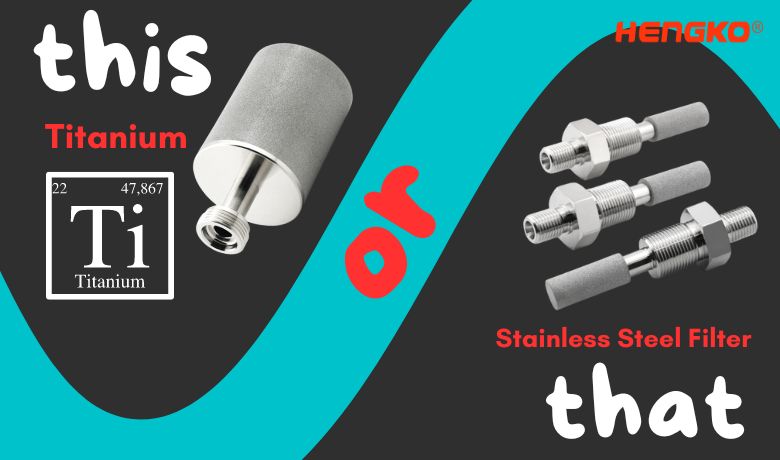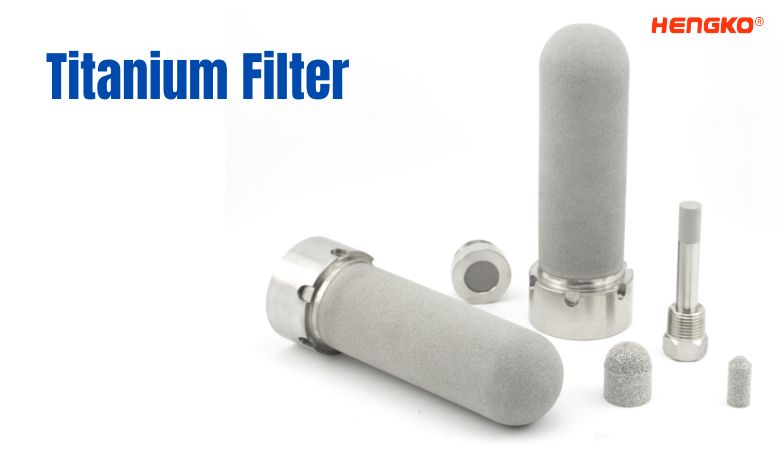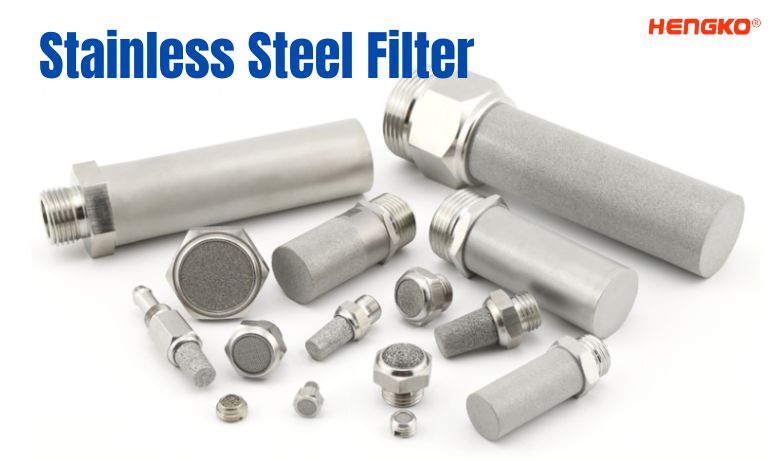
Selecting the right filter material is crucial for ensuring optimal performance, longevity, and efficiency in various industrial and commercial applications. Titanium and stainless steel have emerged as popular choices for filter materials due to their exceptional properties and versatility.
Titanium and stainless steel filters each offer unique advantages that make them suitable for different applications. Titanium is renowned for its exceptional strength-to-weight ratio, corrosion resistance, and biocompatibility. On the other hand, stainless steel is valued for its affordability, wide availability, and good corrosion resistance.
This guide aims to help you make an informed decision when choosing between titanium and stainless steel filters by comparing their key properties, advantages, and limitations. By understanding the strengths and weaknesses of each material, you can select the filter that best meets your specific needs and requirements.
1.Filter Materials: Titanium vs. Stainless Steel
Titanium Filters
*Definition:
Titanium filters are filters made from titanium, a strong, lightweight metal known for its excellent corrosion resistance.
*Properties:
*High Strength-to-weight ratio:
Titanium is incredibly strong for its weight, making it suitable for demanding applications.
*Excellent Corrosion Resistance:
Titanium resists corrosion from seawater, chlorides, and many other harsh chemicals.
*Biocompatible:
Titanium is non-toxic and compatible with human tissue, making it suitable for medical applications.
*High Melting Point:
Titanium has a very high melting point, allowing it to withstand extreme temperatures.

Stainless Steel Filters
*Definition: Stainless steel filters are filters made from stainless steel, a steel alloy with chromium added for enhanced corrosion resistance. There are many grades of stainless steel with varying properties.
*Properties:
*Strong and Durable:
Stainless steel is a strong and durable material that can withstand significant wear and tear.
*Corrosion Resistant:
While not quite as corrosion resistant as titanium, some grades of stainless steel offer
excellent resistance to corrosion, especially to water and mild chemicals.
*Relatively Affordable:
Compared to titanium, stainless steel is a more affordable material.

General Comparison:
| Feature | Titanium Filters | Stainless Steel Filters |
|---|---|---|
| Strength | Very High | High |
| Durability | Excellent | Excellent |
| Corrosion Resistance | Excellent | Very good (grade dependent) |
| Weight | Lightweight | Heavy |
| Biocompatibility | Yes | No |
| Cost | High | More affordable |
2. Key Factors to Consider When Choosing a Filter
Choosing the right filter depends on several factors that influence its effectiveness and performance. Here are some key considerations:
1. Application Needs
*Industrial Applications:
Industrial filters come in various configurations and materials to handle demanding processes.
Here are some examples:
*Chemical Processing: These filters remove contaminants or separate desired products
Chemical processing filter
Pharmaceutical filter
* Household and Commercial Applications:
Filters for homes and businesses address common air and water quality concerns.
Examples include:
*Water Filtration: These filters remove impurities like chlorine, lead, and bacteria from drinking water.
Water filter
Air purifier filter
2. Environmental Conditions
*Temperature Ranges:
3.Cost and budget constraints:
Evaluate the initial cost of the filter material as well as long-term maintenance and replacement costs.
4.Longevity and durability:
Consider the expected lifespan of the filter in your specific application.
5. Filtration efficiency:
Both materials can offer high filtration efficiency, but titanium may have an edge in certain applications
due to its ability to create finer pore structures.
6. Cleaning and maintenance:
Metal filters, including both titanium and stainless steel, can be cleaned and reused, reducing waste
and environmental impact
3. Advantages and Disadvantages
Titanium Filters
Titanium filters offer several distinct advantages:
*Exceptional strength-to-weight ratio:
Titanium is approximately 50% less dense than stainless steel while offering comparable strength, making it ideal for weight-sensitive applications.
*Superior corrosion resistance:
Titanium forms a protective oxide layer that provides excellent resistance to corrosion, even in harsh environments such as saltwater.
*Biocompatibility:
Titanium is highly biocompatible, making it suitable for medical applications and reducing the risk of allergic reactions.
*High-temperature resistance:
Titanium has a higher melting point than stainless steel, making it more suitable for high-temperature applications.
Disadvantages:
*Higher Cost: Titanium is a more expensive material compared to stainless steel, which can impact the overall filter price.
Stainless Steel Filters
Stainless steel filters have their own set of advantages:
* Affordability:
Stainless steel is generally more cost-effective than titanium due to its readily available raw materials and established production methods.
* Wide availability:
Stainless steel is easily accessible in various forms, making it suitable for a wide range of applications.
* Good corrosion resistance:
While not as resistant as titanium, stainless steel offers good protection against rust and moisture.
* Ease of fabrication:
Stainless steel is easier to machine and work with compared to titanium, requiring less specialized tools and techniques.
You can easy to OEM Sintered Stainless Steel Filter For Your Special Filtration System or Projects.
Disadvantages:
*Lower Corrosion Resistance Compared to Titanium:
4. Cost Considerations: Titanium vs. Stainless Steel Filters
Initial Cost:
*Titanium Filters: Significantly more expensive than stainless steel filters of comparable size and function. The higher cost of raw titanium material and its processing contribute to this difference.
*Stainless Steel Filters: Generally the more affordable option. The wider availability and easier manufacturing of stainless steel filters translate to lower initial costs.
Here's a table summarizing the cost considerations:
| Factor | Titanium Filters | Stainless Steel Filters |
|---|---|---|
| Initial Cost | Higher | Lower |
| Maintenance | Potentially lower in harsh environments | May require more frequent cleaning depending on environment |
| Replacement Frequency | Potentially lower | May require more frequent replacements |
| Lifecycle Cost | Can be cost-effective in demanding applications | Generally lower upfront cost, but replacement frequency might increase overall cost |
5. Case Studies and Practical Examples
Example 1: Using titanium filters in marine environments.
*Challenge: Seawater is highly corrosive due to its salt content. Standard filters can quickly degrade and rust in this environment.
Example 2: Stainless steel filters in high-temperature industrial processes.
*Challenge: Industrial processes often involve high temperatures and harsh chemicals. The filter needs to withstand these demanding conditions.
*Solution: Certain grades of stainless steel offer good high-temperature resistance and can handle many industrial chemicals. They are a cost-effective choice for applications like filtering hot gases in power plants or chemical processing plants.
Example 3: Biocompatibility requirements in the medical field (titanium vs. stainless steel).
*Challenge: Medical implants and filters that come in contact with bodily fluids need to be biocompatible, meaning they won't cause harm to the body.
6. Maintenance and Longevity
Maintenance requirements:
*Both titanium and stainless steel filters require minimal maintenance. Regular cleaning and inspection are recommended based on the specific application and operating environment.
Expected lifespan and durability:
*Titanium filters generally have a longer lifespan than stainless steel filters, especially in harsh environments. Their superior corrosion resistance allows them to withstand demanding conditions for extended periods.
*The actual lifespan of both materials depends on various factors. These include operating conditions, maintenance practices, and the specific filter design.
7. Making the Final Decision
Checklist for determining the best filter material for specific needs:
*Application needs: Consider the purpose of the filter and the type of filtration required.
*Cost considerations: Factor in both the initial cost of the filter and potential long-term costs associated with maintenance and replacement.
*Biocompatibility requirements: If the filter will come into contact with human tissue, biocompatibility is a crucial factor.
Summary of key points to consider when choosing between titanium and stainless steel filters:
Choose titanium filters if:
*Exceptional corrosion resistance is critical (e.g., marine environments)
*Lightweight design is essential (e.g., portable applications)
*Biocompatibility is a requirement (e.g., medical devices)
*Long lifespan and minimal maintenance are desired (especially in harsh environments)
Choose stainless steel filters if:
*Cost is a primary concern
*A wide range of sizes and configurations are needed
*Durability and strength are important
Conclusion
Both titanium and stainless steel offer valuable properties for filtration applications.
*Titanium shines in environments requiring top-notch corrosion resistance, biocompatibility,
Final advice on making an informed decision based on specific application requirements.
By carefully considering the factors outlined above and the unique needs of your specific application,
you can make an informed decision about the best filter material for your project.
Contact HENGKO for Sintered Metal Filters :
For personalized advice or to discuss your specific filtration needs, feel free to contact HENGKO by email ka@hengko.com.
Our experts can help you choose the right filter material to ensure optimal performance and cost-effectiveness for your application.
Send your message to us:
Post time: Jun-21-2024




